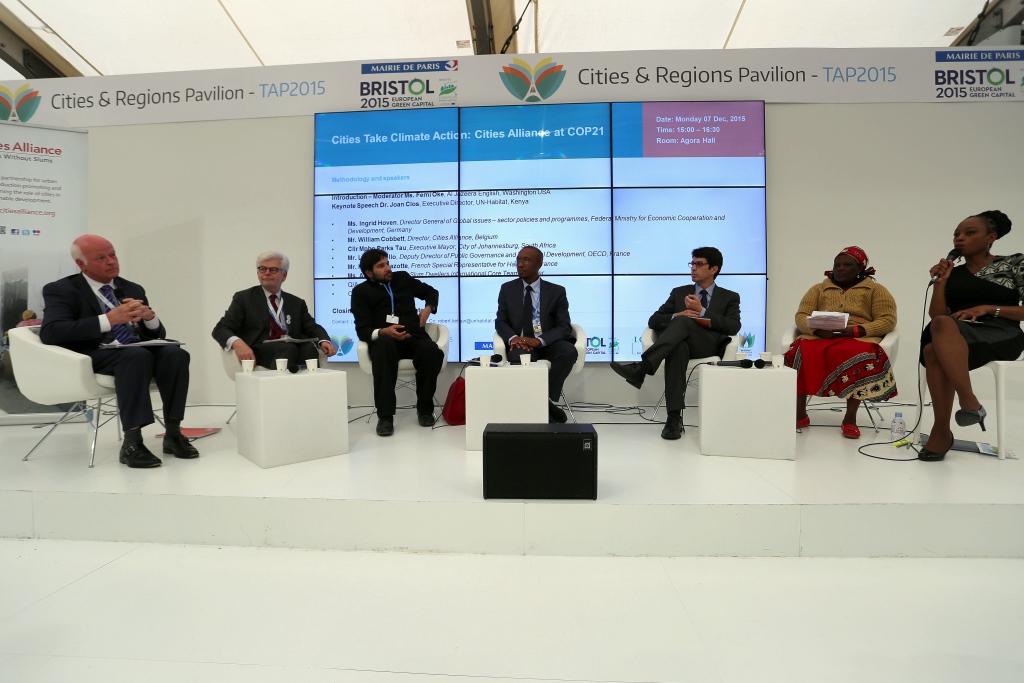Cities Alliance, UN-Habitat: Cities Take Climate Action
Monday 7 December 2015, Paris, France – Cities Alliance, in cooperation with UN-Habitat, hosted a session at the Cities & Regions Pavilion – TAP2015 at the 21st UNFCCC Conference of Parties (COP21). Entitled “Cities Take Climate Action” the session convened representatives of cities, non-governmental organizations, NGOs, national governments and international organizations for a lively debate on how cities are acting on climate change and how this action can be accelerated.
Rafael Tuts, Coordinator, Urban Planning and Design Branch at UN-Habitat, opened the session by highlighting the strong presence of cities at COP21 and the varied actions that they are pursuing. The Compact of Mayors also reflects the ambition of cities to coordinate and act on climate change in a way that is transparent and verifiable, enabled through reporting platforms such as the carbonn Climate Registry, which is one of two used by Compact committed cities.
For the rest of the session, Femi Oke of Al Jazeera English hosted a lively talk-show style debate that covered a number of themes. All emphasized the centrality of cities in climate change debates: Henry de Cazotte, French Special Representative for Habitat III, highlighted the significance of cites at this year’s COP with over 90 side-events dedicated to cities. He also commented that cities are an intersection for the sustainable development goals, climate change, and urbanization, and that helping cities access finance mechanisms is crucial to achieve the desired outcome.
Panellists stressed that climate change mitigation and adaptation actions must be incorporated into every aspect of city planning. As William Cobbett, Director of Cities Alliance stated, “climate action requires cities to do their core business properly – there is no separate box for climate action.”
Key to this kind of thinking is integration and coordination. As Luiz de Mello, Deputy Director of Public Governance and Territorial Development, OECD, France said, “if you don’t have a mechanism to structure dialogues, local governments will work in isolation”. Anastasia Maina of Slum Dwellers International expressed the belief – strongly supported by all panellists – that both national and local governments need to engage the grassroots organizations that are mobilizing citizens in specific actions, like constructing more toilets to in turn provide biogas for electricity generation and manure for agriculture. Ingrid-Gabriella Hoven, Director General of Global Issues – Sector Policies and Programmes, Federal Ministry for Economic Cooperation and Development, Germany similarly commented that investment must be focused not just on infrastructure but on people. Investing in public transportation in Mexico City, for example, had helped to reduce income inequality as well as cutting emissions.
However, there are a number of barriers to this action. National governments need to understand, panellists explained, that partnerships beyond those with cities are required. Structures like local development banks and national housing commissions would play an important role. Mpho Parks Tau, Executive Mayor of the City of Johannesburg, noted that developing cities will often struggle for funding, and Cobbett argued that in many developing countries, basic connections between national and local governments are lacking, while cities lack the financial and political authority to pursue sustainable policies. In addition, coordination is sometimes lacking within cities themselves; many jurisdictions do not have municipal authorities.
Panelists also considered the inevitability of urbanization. Tikender Panwar, Deputy Mayor of Shimla, argued that urbanization is bound to happen. Capitalism can survive, he added; the question is, who will pay the cost? Luiz de Mello pointed out that growth will also happen in rural areas, while Cobbett noted that a lot of urbanization will happen in small and medium-sized cities in Africa, which will pose particular challenges with regards to funding and governance. He added that “the belief that you can invest in host areas to stop people moving has never worked anywhere, anytime.”
At the close of the session, Parks Tau emphasized that cities are already acting on climate and will continue to do so. A new global climate regime was necessary, however, to enhance it. Shimla expressed his hope for a new development paradigm, involving all residents of cities. While some participants were optimistic about the future, the session raised a number of important concerns about ongoing urbanization. Continuing and upscaling climate action will require deep engagement with a range of stakeholders and a clear focus on the areas where urbanization will occur.




